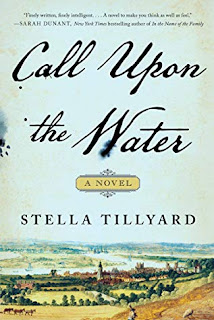Call Upon the Water by Stella Tillyard
Set during the fall and rise of King Charles II of England, this story does not bring court intrigues, what it offers instead is an intense depiction of lives of simple people and those with education who used their knowledge to make a mark in history by draining and developing wetlands for human use. And a deeply moving portrayal of a man exploring the power of nature and the power of love.
1649, Jan Brunt, an engineer, arrives in Great Britain from the Netherlands to work on draining and developing wetlands known as Great Level. His work begins with mapping the area, then planning how to drain the whole. This brings original descriptions.
With another Dutchman leader, they “measure and draw, calculate and note (…) They are the first engineers to map this whole wilderness, and take pride in that fact, as if they were explorers out on the ocean.”
One day, as Jan is engrossed in his work of calculations, a native woman approaches him. Her name is Eliza. When Jan relates his own story, he talks about Eliza in the second person narrative. “As the weeks pass you tell me something of your people and how you live together on islands in the meres.” This creates brilliant prose.
His relationship with Eliza and her telling him how her people claim the land from the waters, make him realize that man was not created “to be the lords of creation, but a part of it.”
The project is so vast and ambitious that it requires not hundreds but thousands men to complete the project. Where shall they find them? General Cromwell offers a solution. He will send prisoners from his wars in Ireland.
After a sabotage of his work, he feels the need to change a place and takes the first opportunity that comes his way and travels to the new colonies in America. He travels freely to New Amsterdam. She is taken as a prisoner to the Colony of Virginia. But what unravels is another beautiful story of her opportunity.
In New Amsterdam, 1664, he records his story and witnesses Charles’ conquest of New Amsterdam, renaming it to New York in honor of his brother James, Duke of York.
With original descriptions and beautiful prose, the author brings a masterful story of a man’s quest to control the nature and to be reunited with the love of his life during a time of colonial conquests.
Usually, I prefer stand-alone books, but the way this book ends, I so hope for a follow-up to this richly imagined story.
Release date: 17 September 2019
@Facebook/BestHistoricalFiction
1649, Jan Brunt, an engineer, arrives in Great Britain from the Netherlands to work on draining and developing wetlands known as Great Level. His work begins with mapping the area, then planning how to drain the whole. This brings original descriptions.
With another Dutchman leader, they “measure and draw, calculate and note (…) They are the first engineers to map this whole wilderness, and take pride in that fact, as if they were explorers out on the ocean.”
One day, as Jan is engrossed in his work of calculations, a native woman approaches him. Her name is Eliza. When Jan relates his own story, he talks about Eliza in the second person narrative. “As the weeks pass you tell me something of your people and how you live together on islands in the meres.” This creates brilliant prose.
His relationship with Eliza and her telling him how her people claim the land from the waters, make him realize that man was not created “to be the lords of creation, but a part of it.”
The project is so vast and ambitious that it requires not hundreds but thousands men to complete the project. Where shall they find them? General Cromwell offers a solution. He will send prisoners from his wars in Ireland.
After a sabotage of his work, he feels the need to change a place and takes the first opportunity that comes his way and travels to the new colonies in America. He travels freely to New Amsterdam. She is taken as a prisoner to the Colony of Virginia. But what unravels is another beautiful story of her opportunity.
In New Amsterdam, 1664, he records his story and witnesses Charles’ conquest of New Amsterdam, renaming it to New York in honor of his brother James, Duke of York.
With original descriptions and beautiful prose, the author brings a masterful story of a man’s quest to control the nature and to be reunited with the love of his life during a time of colonial conquests.
Usually, I prefer stand-alone books, but the way this book ends, I so hope for a follow-up to this richly imagined story.
Release date: 17 September 2019
@Facebook/BestHistoricalFiction

Comments
Post a Comment